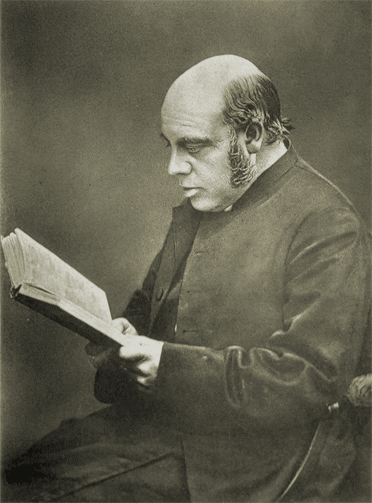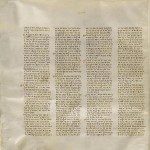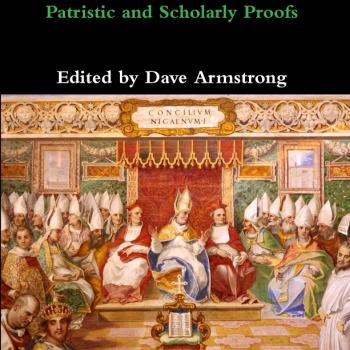
Joseph Barber Lightfoot (1828-1889): Anglican biblical scholar, translator of the early Church fathers and Bishop of Durham. He was a key advocate of the authenticity of the epistles of St. Ignatius of Antioch [public domain / Wikimedia Commons]
***
(6-7-09)
***
The Catholic Encyclopedia (“St. Ignatius of Antioch”) provides an overview summary, with which we can begin our closer examination (my blue coloring):
At intervals during the last several centuries a warm controversy has been carried on by patrologists concerning the authenticity of the Ignatian letters. Each particular recension has had its apologists and its opponents. Each has been favored to the exclusion of all the others, and all, in turn, have been collectively rejected, especially by the coreligionists of Calvin. The reformer himself, in language as violent as it is uncritical (Institutes, 1-3), repudiates in globo the letters which so completely discredit his own peculiar views on ecclesiastical government. The convincing evidence which the letters bear to the Divine origin of Catholic doctrine is not conducive to predisposing non-Catholic critics in their favor, . . .
Calvin exclaimed in his Institutes:
With regard to what they pretend as to Ignatius, if they would have it to be of the least importance, let them prove that the apostles enacted laws concerning Lent, and other corruptions. Nothing can be more nauseating, than the absurdities which have been published under the name of Ignatius; and therefore, the conduct of those who provide themselves with such masks for deception is the less entitled to toleration. (Book I, Chapter 13, Section 29)
And again in his commentary for Philippians 4:3:
Those who maintain this, quote Clement and Ignatius as their authorities. If they quoted correctly, I would not certainly despise men of such eminence. But as writings are brought forward from Eusebius which are spurious, and were contrived by ignorant monks, they are not deserving of much credit among readers of sound judgment. Let us, therefore, inquire as to the thing itself, without taking any false impression from the opinions of men.
Presbyterian W. D. Killen wrote a book in 1886, entitled, The Ignatian Epistles Entirely Spurious. Here is an excerpt, where he mentions Calvin:
The question of the genuineness of the Epistles attributed to Ignatius of Antioch has continued to awaken interest ever since the period of the Reformation. . . . Calvin–who then stood at the head of Protestant theologians–did not hesitate to denounce the whole of them as forgeries.
Elsewhere in the book, he greatly extolled Calvin for his (now thoroughly discredited) opinions:
[I]t is no mean proof of the sagacity of the great Calvin that upwards of three centuries ago he passed a sweeping condemnation on these Ignatian epistles. . . . Calvin knew that an apostolic man must be acquainted with apostolic doctrine, and he saw that these letters must have been the production of an age when the pure light of Christianity was greatly obscured. Hence he denounced them so emphatically; and time has verified his deliverance. (cited in Cyclopaedia of Biblical, Theological, and Ecclesiastical Literature, John McClintock, pp. 492-493)
Robert Ellis Thompson (Presbyterian) notes:
In 1557 Valentin Pacaeus published in Greek twelve epistles bearing the name of Ignatius of Antioch. Their genuineness was at once called into question by Calvin and other good scholars, but they were treated as an authority for primitive episcopacy by Drs. Whitgift, Hooker, Andrews, Hall and others who favored that form of government.
(The Historic Episcopate, Philadelphia: The Westminster Press, 1910, p. 76)
Protestant historian Philip Schaff concurs:
The Larger Greek Recension of Seven Epistles with eight additional ones. Four of them were published in Latin at Paris, 1495, as an appendix to another book; eleven more by Faber Stapulensis, also in Latin, at Paris, 1498; then all fifteen in Greek by Valentine Hartung (called Paceus or Irenaeus) at Dillingen, 1557; and twelve by Andreas Gesner at Zurich, 1560. The Catholics at first accepted them all as genuine works of Ignatius; and Hartung, Baronius, Bellarmin defended at least twelve; but Calvin and the Magdeburg Centuriators rejected them all, and later Catholics surrendered at least eight as utterly untenable. (History of the Christian Church, Vol. II: Ante-Nicene Christianity: A.D. 100-325, chapter 13, § 165. The Ignatian Controversy)
William Cureton, an important and key Ignatian scholar, also confirms this assessment:
. . . others, with J. Calvin, did not scruple to denounce the whole as a barefaced and stupid forgery. (Corpus Ignatianum: A Complete Collection of the Ignatian Epistles, London: Francis & John Rivington, 1849, p. xvii)
A recent book on the apostolic fathers reiterates not only Calvin’s, but general Protestant opposition to the authenticity of the seven Ignatian letters now generally accepted:
Catholic scholars generally defended the authenticity of the letters because of the obvious polemical value of Ignatius’s early date and emphasis on the monepiscopal form of church structure, while Protestants generally denied their authenticity for similar reasons. . . . Not until the independent work of Theodor Zahn (1873) and J. B. Lightfoot (1885) was general recognition of the authenticity of the seven letters contained in the middle recension attained. Recent challenges to the current consensus have not altered the situation. (The Apostolic Fathers, second edition, translated by J. B. Lightfoot and J. R. Harmer, edited and revised by Michael W. Holmes, Grand Rapids, Michigan: Baker Book House, 1989, p. 83)
So, not only did Calvin not accept what St. Ignatius taught in his epistles; he didn’t even accept them as genuine. So he can hardly have incorporated the data therein into his anti-Catholic apologetic. For him, the Ignatian corpus was entirely out of the equation of Protestant-Catholic disputation.
*****
Meta Description: John Calvin, one of the key figures in early Protestantism, rejected the (now universally accepted) epistles of St. Ignatius of Antioch.
Meta Keywords: epistles of St. Ignatius, Ignatius of Antioch, Calvin & Ignatius of Antioch, apostolic succession, Catholic doctrine, Catholic theology, Church fathers, Church fathers & Protestantism, development of doctrine, Early Church, Fathers of the Church, history of Christian doctrine, patristics, patrology, sacred tradition













